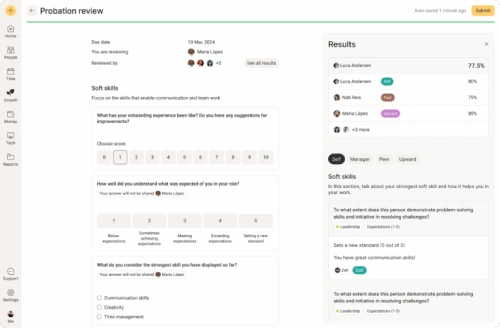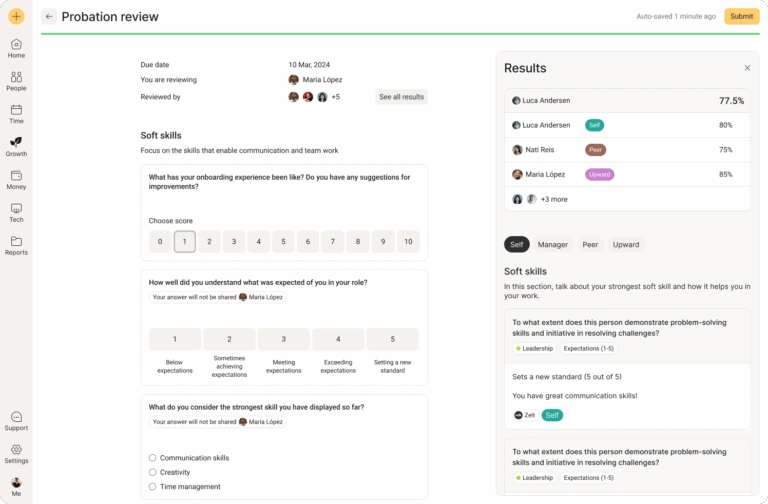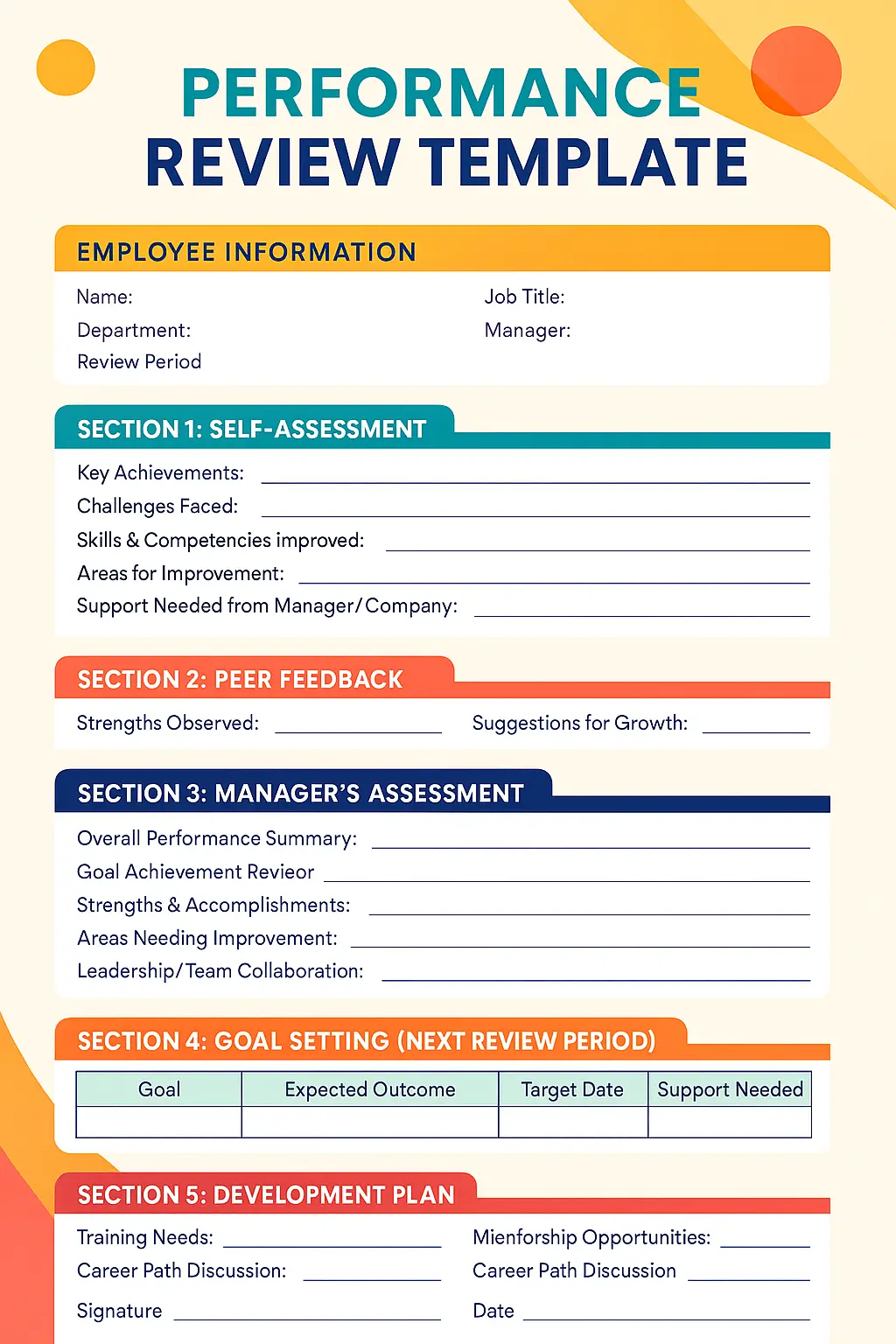50 Best Performance Review Questions to Ask Your Employees

If you are a manager, you know how hard it can be to sit in a review meeting. You want to help your team, but sometimes you do not know what to ask. The room feels heavy, the talk feels forced, and you leave without clear answers. Your team also feels the same. They want guidance, but they do not know how to share. This is the problem with many reviews today, they lack the right questions.
We have made a guide to fix this. Here you will find clear and simple performance review questions that really work. These questions open real talks, not just formal notes. They help managers understand, they help staff feel safe to share. You will see types, categories, and even sample answers. With this, you can turn reviews into easy talks that build trust and growth.
Why Performance Review Questions Matter
They make people open up: Performance review questions are not just small talk. They give a clear way for both managers and employees to share. When you ask the right question, the other person feels safe to open up. This helps both sides see what is working and what is not. Without questions, the review is just a form with no life.
They give employees a voice: For employees, these employee evaluation questions give them a voice. They can share wins, worries, and ideas. And same for managers, questions give a real picture of the team. You can spot skills, find gaps, and guide growth. You also build trust, because your team sees that you listen. This makes them feel part of the company, not just a worker.
They build a culture of growth: Good questions link with growth and feedback culture. They keep the talk honest and simple. A workplace with open questions grows faster, because people know where they stand. They also know how they can improve. Step by step, this builds a culture where feedback is normal and growth is natural.
Still, a Gallup study shows that only 20% of employees feel reviews push them to do better work. This is why the right questions matter.
Talk to an expert
Speak to us to learn how you can simplify performance reviews with Zelt.
Different Types of Performance Review Questions
Performance reviews are not the same for every team. We need different types of performance evaluation questions to get a full picture. Each type opens a new side of the talk. Some focus on goals, some on skills, some on growth. When we use all, the review feels balanced and real. Let us look at the main types.
- Goal-Oriented Questions: These focus on what the employee has done and what they plan next. They help both sides track success and find roadblocks.
- Behavioral Questions: These show how the employee acts in real situations. They give insight into habits, problem solving, and reactions.
- Competency-Based Questions: These test the skills that matter most for the role. They show how the employee uses knowledge and ability in daily work.
- Developmental Questions: These point to growth and the future. They help employees think about skills and career paths. Managers can also see where to give support.
- Self-Evaluation Questions: These let the employee reflect on their own work. They bring out honesty and show how the person sees their role.
- Feedback and Relationship Questions: These build trust between manager and employee. They also show how the workplace feels for the staff.
Performance Review Questions by Category
Performance reviews are easier when we split them into clear groups. Organizing employee review questions into groups also makes the conversation smoother and more focused. Each category focuses on one part of the employee’s work and growth. This makes the talk simple and fair. Here are the main categories with sample questions you can use.

Overall Performance
This part gives a big picture of how the employee feels about their work. It helps both sides reflect on wins and struggles in a simple way.
What accomplishments are you most proud of since our last review?
- Which goals did you meet, and which ones were most challenging?
- What motivates you to perform at your best?
- How would you rate your overall performance this year?
Strengths and Achievements
“We rolled out our performance evaluation system in mid-year of 2021 with one expectation:
All employees were asked to record one professional and one personal goal.
At the end of the year, we asked them to answer four positive questions that provided a self-review of their performance. It gave our employees a chance to shine. It also helped leaders and employees have great dialogue during the yearly review.”
— Debby Routt, former Chief People Experience Officer at Marathon Health,
for Forbes
Here the focus is on what the employee does best. These questions help you find hidden skills and build on them.
- What strengths help you succeed most in your role?
- Are there skills you haven’t had a chance to showcase yet?
- What type of work feels most natural or energising for you?
- How can we make better use of your strengths?
Areas for Improvement
No one is perfect, so it is important to ask about growth areas. These questions show where the employee wants to improve and what support is needed.
- What challenges have you faced recently at work?
- Which skills or areas do you want to improve?
- What feedback from the past year do you want to discuss?
- How can the company help you with development goals?
Role-Specific Questions (Current Responsibilities)
Every role comes with unique duties. These annual review questions link day-to-day tasks with long-term goals.
- Which aspects of your role do you enjoy most, and least?
- How do you feel your responsibilities align with your career goals?
- What would you change about your current role, if possible?
- Do you feel you have the right tools and support to succeed?
Future Growth and Career Development
This part helps the employee think ahead. It gives them a chance to share their career dreams and how the company can support them. These future-focused appraisal questions guide employees to think about long-term goals and growth opportunities.
Research also shows that less than half of employees feel happy with their career growth at work. This gap makes career talks even more important.
- What professional goals do you want to focus on in the coming months?
- What role or position would you like to aim for next?
- What skills do you want to strengthen for future growth?
- What opportunities would help you advance your career here?
- How do you see your role evolving in the next year?
Company Culture and Values
Company culture plays a big role in how employees feel at work. These questions check how well values and daily life match.
- Which of our company values resonate most with you?
- When have you felt most proud to be part of this company?
- What cultural changes would you recommend?
- How can we make our workplace more inclusive and collaborative?
Team Collaboration and Relationships
Work is never done alone. These questions focus on teamwork and how employees connect with others.
- What suggestions do you have for improving team collaboration?
- How do you think the team supports your work?
- What makes teamwork easier for you?
- What could we do to improve communication within the team?
Manager-Focused Questions (Employee → Manager)
Reviews are not only for employees. These performance management questions let staff give feedback to managers in a safe way.
- How would you describe our communication, and how can it improve?
- Do you feel supported in your role by management?
- What could your manager do differently to help you succeed?
- How do you prefer to receive feedback and recognition?
Peer Feedback Questions
Sometimes the best insights come from peers. These questions bring a new angle on teamwork and trust.
- How do your peers support your success?
- Can you share an example where teamwork made a big impact?
- What skills do you admire in your colleagues?
- What can the team do better to support each other?
Self-Evaluation Questions
Self-reflection is key for growth. These questions let employees see themselves and share their honest view.
- What do you consider your biggest achievements this period?
- Which areas do you feel you should improve in?
- How do you think your work has supported the team’s success?
- What goals will you set for yourself before the next review?
Performance review questions to ask manager
Employees play a key role in reviews. This is your chance to talk about your growth, challenges, and future goals. Good questions help you reflect on your progress and ask for the right support. Keeping answers honest and specific also makes it easier for managers to guide you.
- What accomplishments are you most proud of since our last review?
- What new skills have you gained in your current role?
- What challenges do you need more support with?
- How do you see your role evolving in the next year?
- What motivates you most in your daily work?
Sample Answers & Phrasing Tips
It’s not always easy to know how to answer review questions. The way you respond to performance review questions or quarterly review questions can shape how your manager sees your progress. A strong answer is clear, specific, and shows that you are thinking about growth. A weak answer is vague or avoids the point. Here are some sample Q&A examples to guide you.
Q1. What accomplishment(s) are you most proud of?
Good Answer: “This year, I led a project that reduced production time by 30% by setting up a new CMS. It helped my team work faster and improved cross-department collaboration.”
Weak Answer: “I worked hard and did my job well.”
Q2. In which area(s) would you like to improve?
Good Answer: “I want to improve my public speaking. To do this, I plan to lead updates in team meetings and join a short training course.”
Weak Answer: “I don’t think I need to improve much.”
Q3. What have I done to help you do your job better? What have I done to hinder your job performance?
Good Answer: “You’ve given me helpful feedback that made me more confident. At times, shifting priorities have slowed my focus, so clearer direction would help.”
Weak Answer: “Everything is fine.”
Q4. Do you have the resources and tools you need to perform your job?
Good Answer: “Yes, but more training on the new software would help me use it fully.”
Weak Answer: “Yeah, I guess.”
This format shows how simple changes in phrasing can make a big difference. Clear, specific answers show you care about progress, while vague answers miss the chance to stand out.
📄 Looking for ready-to-use a performance review template?
We’ve created a free, downloadable template to make your review process simple and effective.
How to Use Performance Review Questions Effectively
Performance review questions work best when they are used with care. A McKinsey study found that many reviews have little impact on performance. This happens when reviews feel like a ritual and not a real talk. They are not just a checklist. They are tools to open honest and useful conversations. Here’s how to make them more effective:
Preparing for review: Both managers and employees should prepare in advance. Write down key points, goals, and examples. This makes the discussion clear and productive.
Active listening: During the review, listen closely. Managers should give full attention without cutting in. Employees should also listen to feedback and ask clarifying questions. This builds trust and respect.
Following up after review: The review should not end in the meeting. Both sides should set action items and check in later. Tracking progress shows that feedback is taken seriously.
Role of software: Using HR software like Zelt can make this process smoother. It helps record questions, store answers, and track goals over time. This way, reviews are not forgotten and growth stays on track.
How Zelt can help you run smooth performance reviews
Running reviews takes time. A tool can make it easier. Zelt’s performance management software helps in many ways:
Automated cycles
You can set timelines, add people, and launch reviews in minutes. The system handles invites, reminders, and tracking so nothing gets missed.

360° feedback
Employees, peers, and managers can all share input in one place. This makes reviews more fair, balanced, and complete.
Ready-made templates
You get a library of top questions to pick from. Managers can save time and still run reviews that feel professional and clear.
Fair results
With calibration, leaders can compare feedback across teams. This keeps reviews transparent and outcomes consistent.
Many modern teams already use Zelt to make reviews smooth and fair. It lets managers spend less time on admin and more time on people.
Conclusion
Performance review questions are more than a checklist. They open real talks between managers and employees. These talks build trust and show progress. They also help both sides grow together. Step by step, they create a stronger workplace.
The process gets easier with the right tools. Performance review software saves time and keeps everything in one place. A tool like Zelt HR makes reviews smooth and fair. It helps managers lead better. It also gives employees a clear path for growth. Most of all, it keeps the team moving forward.
Frequently Asked Questions
What are good performance review questions?
Good questions are clear and simple. They should help both sides share. Do not ask in a negative way. Ask about goals, wins, and challenges. This makes the talk safe and open.
How should I prepare for a performance review?
Start with clear goals. Write down what you want to discuss. Use forms or templates to guide the review. Send self-review questions to the employee before the meeting. This way both sides come ready.
Why are performance reviews important?
They give space for honest talks. Reviews connect employee goals with company goals. They also help people grow, learn, and feel valued.
How can I make performance reviews more effective?
Ask clear questions. Focus on wins and areas to improve. Let both manager and employee share feedback. Keep the talk open, not one-sided.
How often should performance reviews happen?
Once a year is common. But many teams now do them more often, like every quarter or twice a year. Short and regular check-ins keep feedback fresh.


